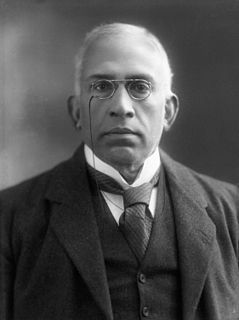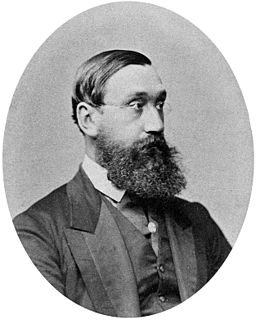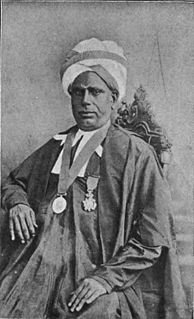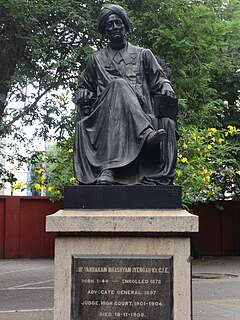
Sir Alexander John Arbuthnot was a British official and writer. He was educated at Rugby School.

Seshadri Srinivasa Iyengar CIE, also seen as Sreenivasa Iyengar and Srinivasa Ayyangar, was an Indian lawyer, freedom-fighter and politician from the Indian National Congress. Iyengar was the Advocate-General of Madras Presidency from 1916 to 1920. He also served as a member of the bar council from 1912 to 1920, the law member of Madras Presidency from 1916 to 1920 and as the president of the Swarajya Party faction of the Indian National Congress from 1923 to 1930. Srinivasa Iyengar was the son-in-law of renowned lawyer and first Indian Advocate-general of Madras, Sir Vembaukum Bhashyam Aiyangar. Iyengar's followers called him Lion of the South.

Sir Chettur Sankaran Nair, CIE was the President of the Indian National Congress in 1897 held at Amravati. Until present he is the only Keralite to hold the post.

Minjur Bhaktavatsalam or Minjur Kanakasabhapathi Bhaktavatsalam was an Indian lawyer, politician and freedom fighter from the state of Tamil Nadu. He served as the Chief Minister of Madras state from 2 October 1963 to 6 March 1967. He was the last Congress chief minister of Tamil Nadu and the last to have taken part in the Indian independence movement.

Sir Pazhamaneri Sundaram Sivaswami Iyer, KCSI, CIE was a prominent lawyer, administrator and statesman who served as the Advocate General of Madras from 1907 to 1911.

Sir Pitti Theagaraya ChettyKCSI was an Indian lawyer, industrialist and a prominent political leader from the erstwhile Madras province. He was one of the founders of the Justice Party in 1916 along with C. Natesa Mudaliar, Dr. T. M. Nair. T.Nagar is a locality in Chennai which is named after him.

Sir Subbier Subramania Iyer was an Indian lawyer, jurist and freedom fighter who, along with Annie Besant, founded the Home Rule Movement. He was popularly known as the "Grand Old Man of South India".

William Robert Cornish was a British physician who served in India for more than thirty years, and became the Surgeon-General—head of medical services—in the Madras Presidency. During the Great Famine of 1876–78, Cornish, then Sanitary Commissioner of Madras, argued for generous famine relief, which put him at odds with Sir Richard Temple, Famine Envoy for the Government of India, who was promoting reduced rations. Some of Cornish's innovations made their way into the Indian Famine Codes of the late 19th century.

Vembaukum RamiengarCSI was an Indian civil servant and administrator who served as the Diwan of Travancore from 1880 to 1887.

Sir Thiruvarur Muthuswamy Iyer was an Indian lawyer who, in 1877, became the first native Indian to be appointed as judge of the Madras High Court. He also acted as the Chief Justice of the Madras High Court in 1893. He is also one of the first Indians to have a statue.

Kottayan Katankot Venugopal, known generally as K. K. Venugopal is an Indian constitutional lawyer and a senior advocate in the Supreme Court of India. On 30 June 2017, he was appointed as the Attorney General of India.

Diwan Bahadur Sir Vembakkam Bhashyam Aiyangar was an eminent lawyer and jurist who served as the first Indian Advocate-General of Madras Province and also as a Judge of the Madras High Court.
Pakala Venkataramana Rao Rajamannar (1901–1979) was an Indian judge and politician who served as the acting Governor of Madras State from 1957 to 1958. P.V. Rajamannar was the first Indian to become Chief Justice of Madras High Court after independence from 1948 to 1961. He was also the first Chairman of Sangeet Natak Akademi in New Delhi.

Eardley John Norton was a Madras barrister, Coroner and politician of British origin. He was also one of the earliest members of the Indian National Congress and a champion of civil liberties and rights of the Indian people.
Sir George Townsend BoagKCIECSI (1884–1969) was a British Indian civil servant, statistician and administrator who served as the Acting Governor of Odisha from 11 August 1938 to 8 December 1938.

Thiruvalangadu Raju Venkatarama SastriCIE was an Indian lawyer and politician who served as the Advocate-General for Madras Presidency from 1924 to 1928. He was also known as T.R.V.Sastri.
John Bruce Norton was a British lawyer and educationist who served as the Advocate-General of Madras Presidency. He was the father of lawyer and Indian independence activist Eardley Norton.

Edgar William Middlemast (1864–1915) was a British mathematician and educator in India in the early twentieth century. He served as the Deputy Director of the Department of Public Instruction, Madras Presidency, as Professor of Mathematics at the Presidency College, Madras from 1910 and as Principal of the college in 1915.
Govind Swaminadhan was an Indian lawyer who served as the Advocate-General of Tamil Nadu from 1969 to 1976. He also served as president of the Madras Bar Association.


















